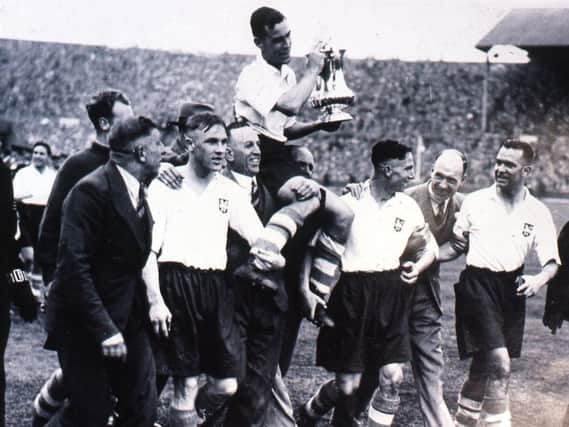Day Lancashire Post nearly missed Preston North End's FA Cup win


But the day the Lilywhites won the FA Cup for the second time was almost one of the most embarrassing in the history of the Lancashire Post.The story of how the county’s newspaper almost sent thousands of copies with the wrong scoreline on to the streets has passed into legend among relatives of the man who saved the day.Former Post sports journalist Ron Page died last month at the age of 93 after a long and eventful life.His son Andy recalls the day Ron (inset below) spared his employer’s blushes on the biggest day of the year for the newspaper.He says: “Upon leaving school, Ron took up an apprenticeship at the Lancashire Evening Post in the sports section. Can you imagine the delight, so early in their careers, when their home town team, their cherished PNE, reached the 1938 FA Cup Final at Wembley? North End had lost in the Cup Final the previous season, so there was great anticipation. Off they went for a momentous trip of a lifetime to London, full of hope and excitement.“The old Wembley stadium at that time was already becoming dated. The set-up for journalists inside the ground was less than ideal. The sports editor was up in the stand in the Press Box, but the telephones were down below on the concourse. The routine was established, that the sports editor would write his commentary notes and hand them to the young apprentices. They had a relay system going to take turns at calling-in the report to the Preston office. “In those days, the paper would have several editions published throughout the day, culminating in the Final Edition. The system worked well, though there was precious little to report. The match was a pretty dull stalemate, with no goals at all before going into the half-hour of extra time. “The messages back to the office were, quite frankly, getting banal. So gloomy and boring a match was it that the sports editor in the stands took the risk of getting an early exit to avoid the inevitable crush – what a mistake!“With the game drawing to a close, and the entire crowd urging the referee to put them all out of their misery, Ron was handed the final note back home – ‘boring Nil-Nil draw, replay next week at Villa Park.’ Below the stands Ron was about to call it through to the office, on pins to be ready to ‘leg-it’ with his colleagues to depart the stadium. Just as he begins his message, a roar goes up. Dilemma, does he continue his message?“No, he rushes back up the steps into the stand, just in time to see George Mutch hit the back of the net with the winning penalty, virtually the last kick of the game! Bedlam ensues. In fairness to the sports editor, even the BBC commentator is on record as saying that ‘if there’s a goal in this game, I’ll eat my hat’.“And what reward for the young Ron for saving the sports editor’s neck, and the paper from grave embarrassment? He had to wait until they broke up for Christmas, when everyone lined up to receive their ‘bonus’ festive pay packet from the paper’s owner. “Ron got his standard pay packet, but then, directly from the chief’s personal wallet, a £5 note (one of the big, old white ones). He must have been earning way less than that back then, so a significant amount to the young lad.”Ron’s father, Bill Page, was a top crown green bowler –while his mother, Sarah Ann Page, was a member of the famous Dick, Kerr Ladies during the First World War. Given his family background, it was no surprise that Ron was also an avid sportsman. Football was his greatest passion and he played for the Preston Schools’ XI. It was while playing with the town team that he struck up a friendship with the late Sir Tom Finney. Both of them were the ‘nippy wingers’ in the side. Ron’s everlasting, tongue-in-cheek, ‘claim to fame’ was to have played left wing for Preston Schools en route to the English Schools final in the mid 1930s while Finney was sat on the bench.The men’s friendship continued after their playing days were both over and in the mid-1960s Sir Tom went round to Ron’s house to replace the family’s kitchen window proving that not only was he a plumber but a deft joiner and glazier, too.